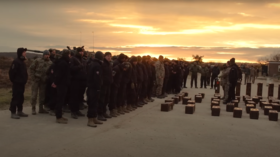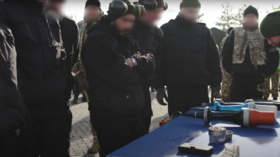UK confirms depleted uranium munitions already in Ukraine

The UK government has already started shipments of depleted uranium ammunition to Ukraine, Armed Forces Minister James Heappey has told parliament. He added that the British military would not attempt to track where the weapons are used.
In response to questions from Scottish MP Kenny MacAskill, Heappey confirmed on Tuesday that DU munitions for the UK-made Challenger 2 tank had already arrived in Ukraine, though declined to comment on Kiev’s “usage rates for the rounds provided.”
“We have sent thousands of rounds of Challenger 2 ammunition to Ukraine, including depleted uranium armour-piercing rounds,” he said, adding the weapons “are now under the control of the Armed Forces of Ukraine (AFU)” and that the Defence Ministry “does not monitor the locations from where DU rounds are fired by the AFU in Ukraine.”
Asked whether the government has a responsibility to “help clear up depleted uranium rounds” used in Ukraine after the conflict, the minister stated it has “no obligation” to do so, instead stressing “Ukraine's immediate needs.”
While Heappey has claimed that the health and environmental risks posed by depleted uranium are “low,” citing the “monitoring of UK military veterans” performed for a government study in 2007, more recent research suggests the munitions could carry health hazards after all. The US used DU ammunition heavily during its two wars in Iraq, with some researchers claiming the weapons could be linked to a spate of birth defects later observed in the country.
According to Doug Weir, an expert with the Conflict and Environment Observatory, when DU penetrators strike a target, “they fragment and burn, generating chemically toxic and radioactive DU particulate that poses an inhalational risk to people.” Both the US and UK governments have long disputed the alleged dangers, however.
In March, British and American advisers oversaw special training for Ukrainian troops for how to handle DU rounds, which will primarily be used for the Challenger 2 tank. London previously vowed to send a total of 14 of the tanks to Ukraine, though it is unclear whether any have reached the battlefield.
Moscow has repeatedly urged against foreign arms shipments to Kiev, especially the British DU munitions, with the Foreign Ministry condemning London for “absolute recklessness, irresponsibility and impunity.” Last month, the Russian military also warned that the use of uranium shells is likely to “cause irreparable harm” to the health of Ukrainians and inflict “tremendous economic damage to the agro-industrial complex” in the region, citing the weapon’s impact in Iraq.














